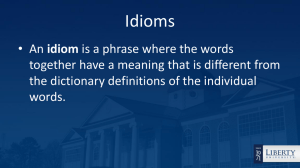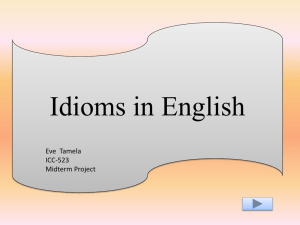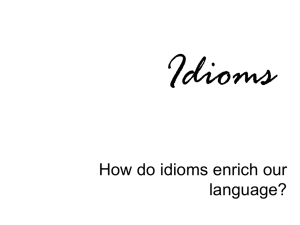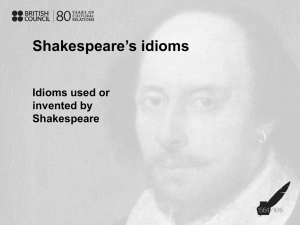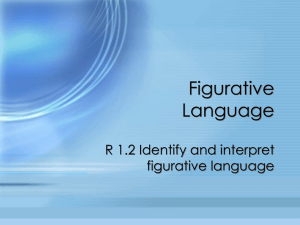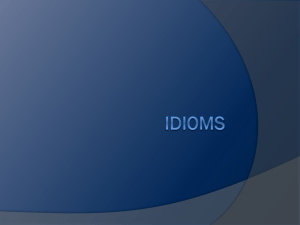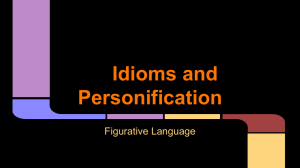1.the licture of Mirav and Shay The lecture of Mirave was
advertisement
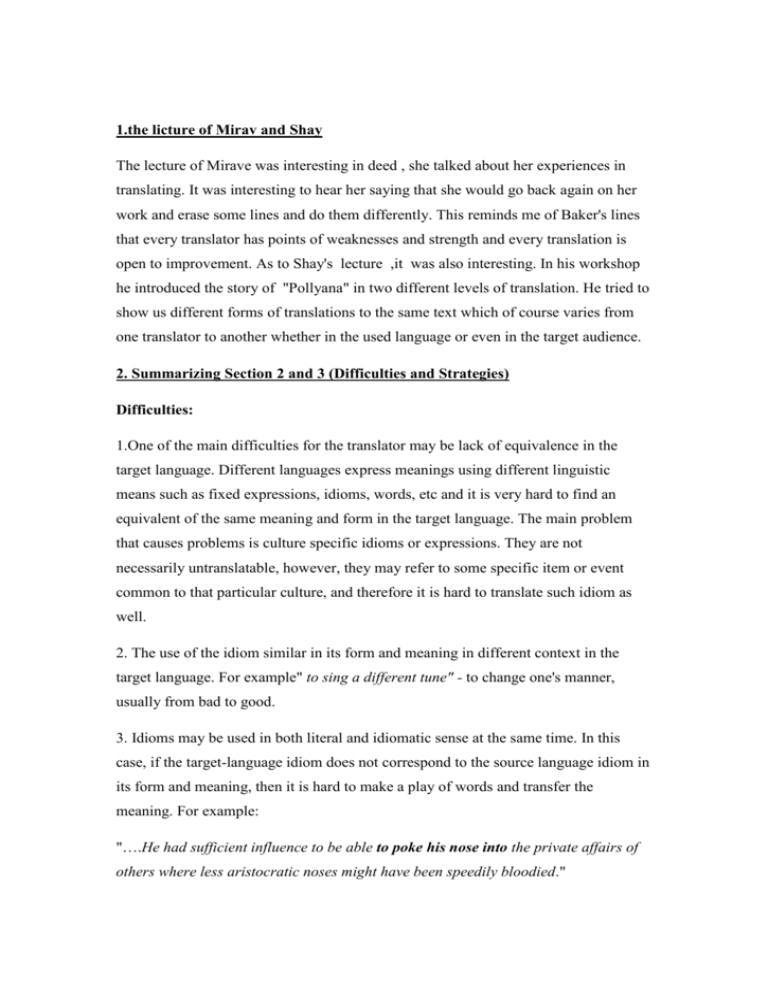
1.the licture of Mirav and Shay The lecture of Mirave was interesting in deed , she talked about her experiences in translating. It was interesting to hear her saying that she would go back again on her work and erase some lines and do them differently. This reminds me of Baker's lines that every translator has points of weaknesses and strength and every translation is open to improvement. As to Shay's lecture ,it was also interesting. In his workshop he introduced the story of "Pollyana" in two different levels of translation. He tried to show us different forms of translations to the same text which of course varies from one translator to another whether in the used language or even in the target audience. 2. Summarizing Section 2 and 3 (Difficulties and Strategies) Difficulties: 1.One of the main difficulties for the translator may be lack of equivalence in the target language. Different languages express meanings using different linguistic means such as fixed expressions, idioms, words, etc and it is very hard to find an equivalent of the same meaning and form in the target language. The main problem that causes problems is culture specific idioms or expressions. They are not necessarily untranslatable, however, they may refer to some specific item or event common to that particular culture, and therefore it is hard to translate such idiom as well. 2. The use of the idiom similar in its form and meaning in different context in the target language. For example" to sing a different tune" - to change one's manner, usually from bad to good. 3. Idioms may be used in both literal and idiomatic sense at the same time. In this case, if the target-language idiom does not correspond to the source language idiom in its form and meaning, then it is hard to make a play of words and transfer the meaning. For example: "….He had sufficient influence to be able to poke his nose into the private affairs of others where less aristocratic noses might have been speedily bloodied." In this example Mona Baker introduces idiom ‘to poke your nose’ which is used in both literal and idiomatic sense. To translate such an idiom, translator must find an equivalent in the target language. 4. All languages have got some "rhetorical‟ formulae which belong merely to their own language. These rhetorical aspects of languages differ from each other. For instance while a language may use a high number of honorifics in its pronominal system as a rhetorical means, another language may make a vivid distinction between the written and spoken discourse where the written form is regarded as more formal than the spoken mode. Strategies According to Baker, although there are some difficulties in the process of translating idioms and fixed expressions, there are some strategies to overcome such probable difficulties: 1. Using an idiom of similar meaning and form which means that translating TL idiom similar in its form and meaning to the SL idiom. 2. Using an idiom of similar meaning but dissimilar form. In this case, the translator does not preserve the lexical items and translate as a semantic equivalent. Example: SL( English) very much at home ------ TL (Chinese): totally at ease. 3. Borrowing the source language idiom: This strategy is usually used in dealing with culture-specific items, modern concepts, and buzz words. Using the loan word with an explanation is very useful when a word is repeated several times in the text. At the first time the word is mentioned by the explanation and in the next times the word can be used by its own. Example: Out of this world – from another galaxy, beyond the earth environment. 4. Translating by paraphrase: translators often cannot translate a SL idioms as a TL idiom, therefore they use the paraphrase strategy by using a word or a group of words in TL exactly related to the meaning of that idiom in SL which may be a non-idiom. Example: SL (English) shutting the stable door when the horse has bolted (p.81) –TL(French) : too little too late 5. Translation by omission: According to Baker This means that an idiom is entirely deleted in the TL because “it has no close match in the target language, its meaning cannot be easily paraphrased, or for stylistic reasons” This strategy is done mostly in the sentence or paragraph level. The reason for this phenomenon is that when an idiomatic expression is omitted, nearly always there is a „loss‟ in the meaning. To „compensate‟ the resulting loss, one is obliged to mention some supplementary words in some parts of the sentence or paragraph where an omission has been done. Example: ….SL (English) :Pre dated bonus for good measure --- TL (Arabic): the date of which had been previously decided on. 3. Comments on the first group of idioms a. לשם מה לכל הרוחות אתה צריך אותי What in the world do you need me for? The strategy that was used here is using an idiom of similar meaning but dissimilar form. b. ...בעקבות הטעות שלעולם חוזרת As a result of the error that always occurs The strategy that was used here is the strategy of using an idiom of similar meaning and form לא תבשיל ולא פירות:יחיא קרח מכאן ומכאן c. Yaha now lost in both directions; neither cooked food nor fruit came his way The strategy that was used here is translation by paraphrase since the match cannot be found in the target language. 4. Translating idioms is one of the most difficult tasks for translators. The main problems consist in recognizing an idiom, understanding it and distinguishing idiomatic from non-idiomatic usage. Better understanding and using idioms needs both knowing their historical background and familiarity with both the S and the T cultures, and having a clear idea about their different situational context. The idiom כולי אוזןand מאחורי גבוI'm all ears and behind his back are familiar in both languages thus it was easy to recognize and translate . However, the frustration that could face someone who is trying to translate the idiom לחיות מן היד אל הפהcould occur when there is no equivalent idiom in the target language therefore it was translated literally by meaning and form while its true meaning is totally different " whatever he earns by work immediately spend it on his daily needs".

